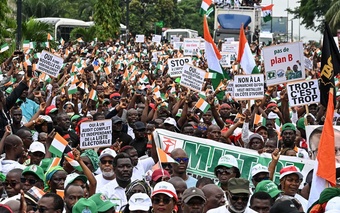Violence and arrests over the weekend have deepened
political tensions in Côte d'Ivoire, after opposition supporters took to the
streets to protest President Alassane Ouattara’s decision to run for a fourth
term in October. Several opposition leaders have been barred from the race, and
their parties say the arrests are part of a wider crackdown.
The unrest comes as the country prepares for elections on 25
October. Court rulings have excluded several major opposition figures,
including former president Laurent Gbagbo of the African People’s Party
(PPA-CI) and Tidjane Thiam of the PDCI-RDA.
On Sunday, PPA-CI said six of its members were arrested in
what it described as a wave of repression. The party claimed they were
“kidnapped and taken to unknown locations” during the night from Saturday to
Sunday.
“A wave of repression is sweeping across our leaders and
activists,” said Sébastien Dano Djédjé, executive president of the PPA-CI, at a
press conference attended by RFI's correspondent.
He called for the immediate release of the six, one of whom
is a substitute deputy for a district in the economic capital Abidjan.
Interior Minister Vagondo
Diomandé said on Sunday that 11 people had been arrested by security
forces following violence in Abidjan’s Yopougon district on the night of Friday
1 August.
The PDCI-RDA,
led by, also protested the arrest of six youth leaders last week. The party
said the circumstances were “unclear” and “worrying”.
A struggle for candidates
President Ouattara, 83, confirmed last week that he will
seek a fourth term.
But opposition leaders say they have been unfairly targeted.
Gbagbo, Thiam, former youth minister Charles Blé Goudé and exiled former prime
minister Guillaume Soro have all been struck from the electoral roll by court
decisions.
None of them are expected to be allowed to run in October.
In a pastoral letter published last week, the Bishops’
Conference of Côte d’Ivoire called for a “fair and inclusive” vote in which all
major candidates could take part.
Jacques Ahiwa, Archbishop
of Bouaké, told RFI that the church is trying to respond to people’s fears.
“People are worried about a potentially violent election,”
he said on Monday. “With every past poll, people have been afraid and this is
coming back; people are asking us to pray but also to act. As religious men, we
must act to preserve peace.”
He said the lack of plurality was a concern, and warned that
excluding major candidates could harm the democratic process.
He called for platforms for dialogue and peaceful debate to
prevent further protests and violence.
“We need to use African wisdom to preserve peace and save human life,” he said.


 Take Voters' Compass
Take Voters' Compass